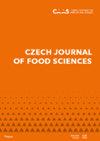土耳其型无筋蒸粗麦粉的化学成分和蒸煮性能评价
IF 1
4区 农林科学
Q4 FOOD SCIENCE & TECHNOLOGY
引用次数: 0
摘要
在这项研究中,目的是生产无麸质形式的传统蒸粗麦粉。为此,在配方中以不同比例(15%、20%、25%和30%)添加米粉(RF)和预处理(糊化)米粉(GRF),而不是添加胶和酶,以提供所需的结构。同时制备了不含GRF的对照样品。随着GRF的添加,粗麦粉样品中总膳食纤维(TDF)含量升高,碳水化合物和能量值相反降低。GRF降低了蒸粗麦粉样品的总可溶性有机物质(TSOM)水平和蒸煮损失,导致其变形性降低。结果表明,用GRF制备无麸质大米蒸粗麦粉是成功的,特别是在30%的比例下。在这些蒸粗麦粉样品中观察到良好的烹饪性能。在这种情况下,与对照样品相比,添加30% GRF的样品吸水率和溶胀体积更高,蒸煮损失更小。粗麦粉样品灰分、膳食纤维和脂肪含量较高,植酸比较低(P < 0.05)。测定了样品的蒸煮时间与蒸煮损失和总可溶性有机物有显著的相关性。结果表明,主成分分析表明,蒸煮试验(吸水率和溶胀量)与化学成分(水分、灰分、粗脂肪和TDF)之间存在明显的相关性。本文章由计算机程序翻译,如有差异,请以英文原文为准。
Evaluation of chemical composition and cooking properties of Turkish type gluten-free rice couscous
In this study, the aim was to produce traditional couscous in gluten-free form. For this purpose, rice flour (RF) and pre-treated (gelatinized) rice flour (GRF) were added in varying proportions (15, 20, 25, and 30%) to the recipe instead of gums and enzymes in order to provide the desired structure. The control sample without GRF was also produced. With the addition of GRF, the total dietary fibre (TDF) content in the couscous samples increased, and reversely the carbohydrate and energy values decreased. The GRF reduced the level of total soluble organic material (TSOM) as well as the cooking loss of the couscous samples, which resulted in lower deformability. According to the results, the gluten-free rice couscous was successfully produced with GRF, especially at a 30% ratio. Good cooking properties were observed in these couscous samples. In this context, in the addition of 30% GRF, higher water absorption and swelling volume with lower cooking loss were observed compared with the control sample. In addition, the couscous samples had higher ash, dietary fibre and fat content as well as a lower phytic acid ratio (P < 0.05). It was determined that there was significant correlation between the cooking time of the samples with the cooking loss and total soluble organic material. According to the results, the PCA showed that there were clear correlations between cooking trials (water absorption and swelling volume) and chemical composition (moisture, ash, crude fat, and TDF).
求助全文
通过发布文献求助,成功后即可免费获取论文全文。
去求助
来源期刊

Czech Journal of Food Sciences
Food Science & Technology, Chemistry-食品科技
CiteScore
2.60
自引率
0.00%
发文量
48
审稿时长
7 months
期刊介绍:
Original research, critical review articles, and short communications dealing with food technology and processing (including food biochemistry, mikrobiology, analyse, engineering, nutrition and economy). Papers are published in English.
 求助内容:
求助内容: 应助结果提醒方式:
应助结果提醒方式:


